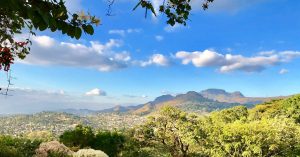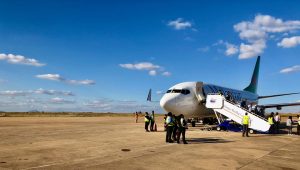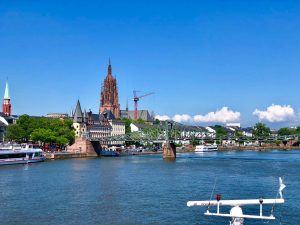The trip from Bethlehem, PA to Blantyre, Malawi took 5 flights and a total of three days. I went from Bethlehem>Chicago>Houston>Frankfurt>Johannessburg>Blantyre. We arrived in the evening on June 6, 2018. So far I love Malawi! Everyone is so nice and I can DEFINITELY see why its nicknamed the warm heart of Africa.

Day 1
Thursday June 7, 2018
Settling In (Thank You Enock)
Goals Accomplished:
1) Met our bosses
2) Visited Our Workplaces
3) Located Restaurants and Grocery stores
4) Exchanged Money
5) Bought Food, and Phones
The morning after arriving, we began visiting the sites where we would be working. First, we went out to the Rice 360 office to meet Dr. Leautaud and let her know we had settled in. Enock, one of the doctors who picked us up from the airport, was able to give us a ride there. The office was really nice and we met some of the Rice 360 staff there including Vanessa, Sara, Ava, and others (not sure if I’m spelling their names right). This is where we will be meeting for team debriefs/ meetings with Rice 360 staff.
We then briefly visited the Neonatal Intensive Care Unit (NICU) at Queens where we will be visiting to do needs finding (looking at areas that need help). Prince, one of the registered nurses at the Queens NICU, was able to give us a rundown of the different areas of the (small) NICU and some of the obstacles they are encountering. Queens is the LARGEST NICU in Malawi and it had about 20 beds for babies (about the size of a large living room). We were all taking many notes on our phones/ notebooks already. Some of the major things we noted included:
1) Low Staff: Prince is the only one who knows how to use the centrifuge to test the blood bilirubin levels (indicator of jaundice) in babies. (He was supposed to be on vacation but he was still at Queens because of the babies)
2) Medical Device Grave Yard: Many medical devices are donated without instructions or repair manuals so they are thrown away
3) Dangerous Equipment: They use make shift incubators called hot-cots that are easy to use but they often overheat babies (no temperature sensors) or break.
I have a ton of other observation. Too many to list them all here.
After the 30 minutes at Queens, we walked back to the Rice 360 office and Dr. Leautaud gave us a rundown of the week’s events including a dinner with Dean Reggie, (Rice Dean of the School of Engineering), project presentations, and visits to the local hospitals. She also gave us suggested places to buy cell phones buy groceries, and buy lunch.
Next we all walked from the office to the Design Studio/MOEDK (Malawi Oshman Engineering Design Kitchen) at the Poly. We met Francis who will be working with us during our time at the design studio. He gave us the keys to the studio since the whole Rice 360 team had a retreat planned the next day (Friday) and we needed the space to work on our prototypes before the presentations on Monday.

The rest of the day was spent settling in. Enock was a great help to us since he helped us figure out our phone situations and helped us exchange money. We are definitely adjusting to living in Malawi.
Day 2
Friday June 8, 2018
Make NO Assumptions
Today we made many assumptions that kind of threw off our schedule! It is very dangerous to make plans that are based on assumptions! From now on, we will make sure that our facts are straight before we proceed with anything else.
Goals Accomplished
1) Figure out the Shuttle
2) Finish Up Project Prototypes at the Poly
3) Pick up other necessities
Assumptions Made
1) The shuttle outside my room was the Kabula Lodge shuttle
2) The Poly Has Wifi
3) The bread at SPAR was jelly filled
4) The Kabula shuttle was picking us up at 4:30
The lodge we are staying at has a daily shuttle to and from Queens. We were told that the shuttle left at 7:30 AM and returned at 4:30 PM. Because of Assumption 1, we got on the wrong shuttle and missed the actual shuttle. We ended up arriving at the Poly around 9:30 AM instead of 8 AM. Then we began getting familiar with the design studio and all of the tools available. It is very similar to the OEDK at Rice, just a bit colder and smaller. There was also no wifi (Assumption 2) which made it slightly difficult to communicate and to retrieve some information that we hadn’t downloaded.

Sajel and I unpacked the Cervical Cancer Training Kits and thankfully they made it to Malawi unharmed! We had nothing to really fix so I helped out Franklin with the bilispec. I helped him solder some connections using a soldering iron, solder, wire, a battery, crimp pins, heat shrink, and a connector. We finished our prototypes by noon and headed to lunch at a place across the street called SPAR. There was a really good bread that looked like a jelly filled donut (Assumption 3). I ordered it. There was no jelly but still good.


After lunch we prepared our presentations and cleaned up our mess. At around 4 PM, we walked back to Queens to be picked up by the lodge shuttle (Assumption 4). The shuttle never came (I think it was his day off) and we called Enock to give us a ride home.
Day 3-4
Saturday and Sunday June 9-10,2018
It’s The Weekend!
Friday night we made last minute reservations to visit a tea plantation for a tea tasting. It was a very nice trip. The plantation had a ton of different teas and we learned that all teas come from the same leaves, but are processed differently to achieve different flavors. Tea is also a hardy and bitter crop, therefore it doesn’t need much protection from bugs unlike coffee (coffee beans are sweet). Lastly we learned not to gift Malawians any tea unless it is accompanied by twice its weight in sugar!
We also went out for a traditional Malawian meal with Edson, a Rice 360 favorite driver. I had Nsima (kind of like mashed potatoes but made of maize/corn) and the local fish. It was very good. All of the food we have had so far has been so fresh and so amazing! I love it.
Today, Sunday June 10, 2018, marks the end of my first week in Malawi. We worked out in the morning, then we did laundry (hand wash). We will be having dinner with Dean Reggie later today! Afterwards we will practice our presentations for tomorrow morning! I am excited to get the ball rolling with our technologies afterwards!


















